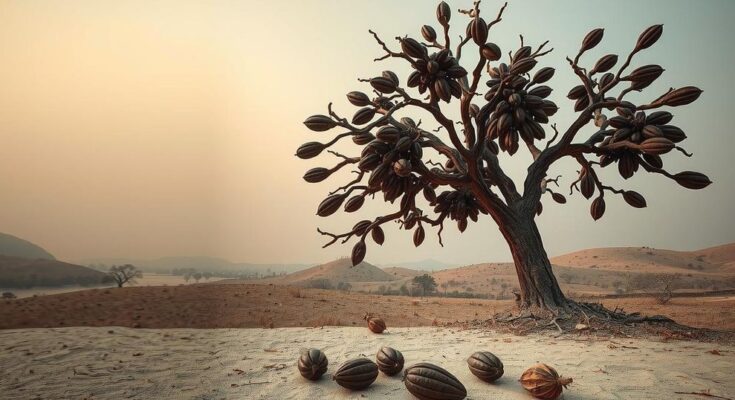Climate change is threatening the availability of chocolates for Valentine’s Day, as erratic weather patterns and rising prices destabilize cocoa farming. Reports indicate cocoa prices increased by 400% due to droughts and floods in major producing areas, particularly Ghana and Ivory Coast, where crop failures are forcing farmers into uncertainty. Advocacy groups emphasize the need for emission reductions and financial support for cocoa growers to address these pressing challenges.
Climate change poses a significant threat to the traditional Valentine’s Day gift of chocolates, as indicated by campaigners. Erratic weather patterns and increasing global temperatures in major cocoa-producing nations have escalated prices and generated instability for farmers. A report from Christian Aid highlights that cocoa prices have surged by 400% due to droughts and floods, leading to diminishing crop availability.
The primary cocoa-producing countries, Ghana and Ivory Coast, which account for over 50% of global cocoa supply, have experienced severe climate impacts. Unforeseen heavy rainfall during Ghana’s dry season has harmed crops via black pod disease, followed by a serious drought in 2024. The United Nations estimates over one million individuals are affected by crop failures and soaring food prices, largely exacerbated by climate change.
A study from Climate Central reveals that West Africa’s cocoa belt is even more vulnerable due to rising temperatures. Data shows that climate change has resulted in noticeably higher daily maximum temperatures over the past decade, significantly stressing cocoa production. Notably, 2024 has seen temperatures exceed optimal growth levels for cocoa across 71% of these regions.
Globally, cocoa cultivation is not solely restricted to Africa; farmers in other nations, such as Guatemala, also report adverse impacts. Amelia Pop Chocoj, a Guatemalan cocoa grower, expressed concern about her dying plantations, attributing the crisis to insufficient water supply. She emphasized that climate-related losses are currently occurring, not merely possible in the future.
In response, Christian Aid urges immediate action to reduce emissions from fossil fuels that drive climate change and to provide financial support for cocoa farmers to help them adapt to these changing conditions. UK chocolatiers are also expressing worries as the climate crisis, compounded by El Niño and La Niña patterns, threatens small businesses in the chocolate industry.
Andy Soden of Kernow Chocolate stated that wholesale chocolate prices are nearing a critical point, approaching the previous retail prices due to these challenges. He remarked, “It’s a nightmare. I don’t think any business involved in chocolate has avoided this impact, and it’s all down to climate change.”
Osai Ojigho of Christian Aid underscored the importance of cocoa farming for impoverished communities, declaring, “Growing cocoa is a vital livelihood for many of the poorest people around the world and human-caused climate change is putting that under serious threat.” She urged for both emissions reductions and targeted climate financing to support cocoa growers in their adaptation efforts.
In conclusion, climate change critically endangers the cocoa industry, jeopardizing the availability of chocolates as gifts, particularly on occasions like Valentine’s Day. The soaring prices and significant crop losses caused by extreme weather conditions threaten the livelihoods of farmers, particularly in key cocoa-producing regions. Urgent actions are needed to mitigate emissions and financially assist affected cocoa farmers to ensure their sustainability and the future of chocolate production.
Original Source: www.perspectivemedia.com




